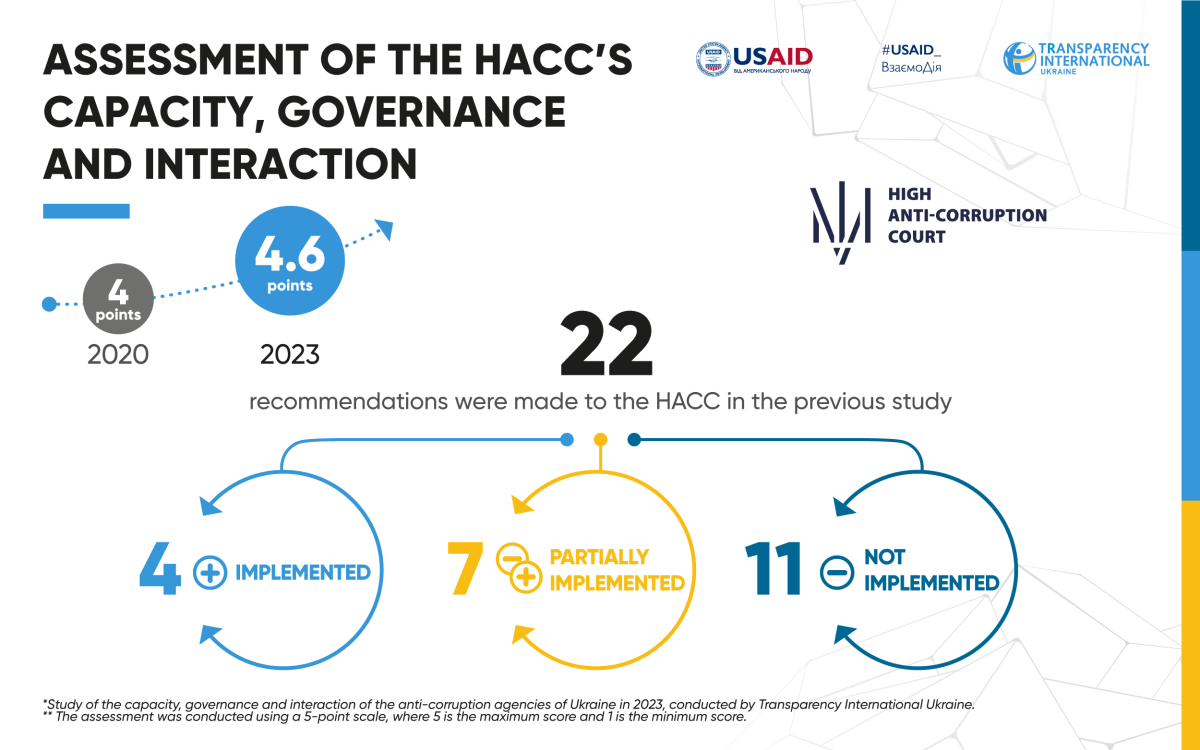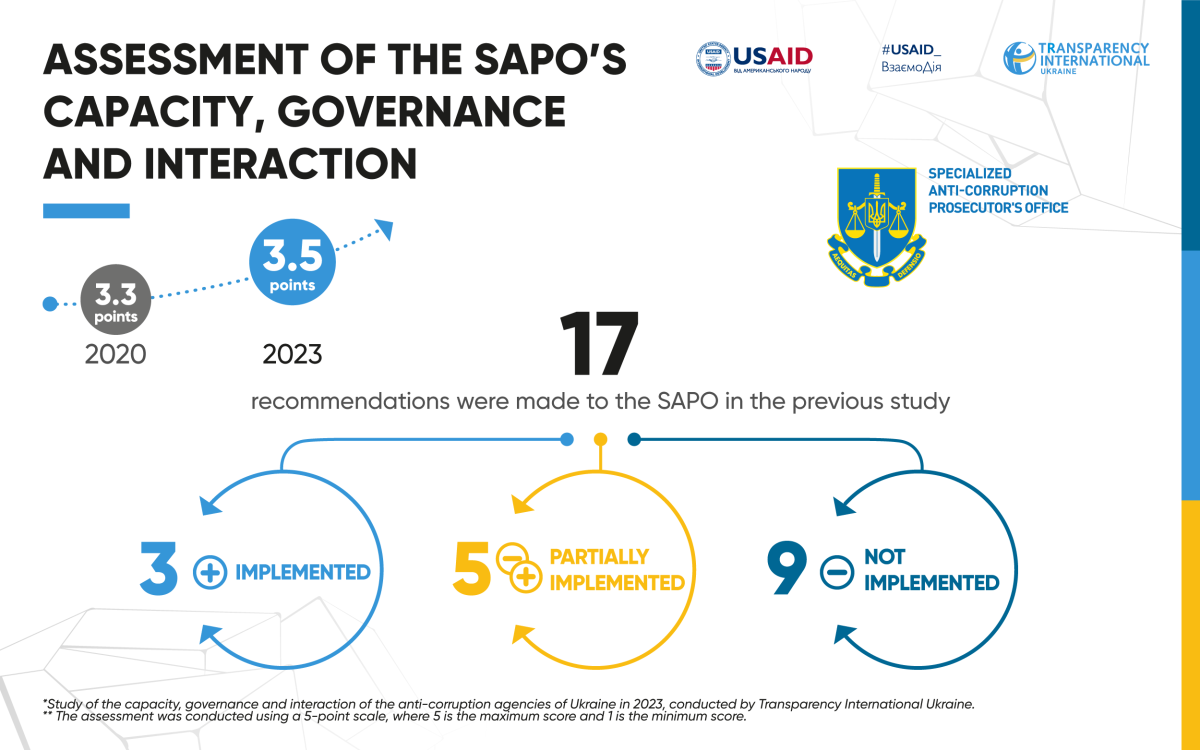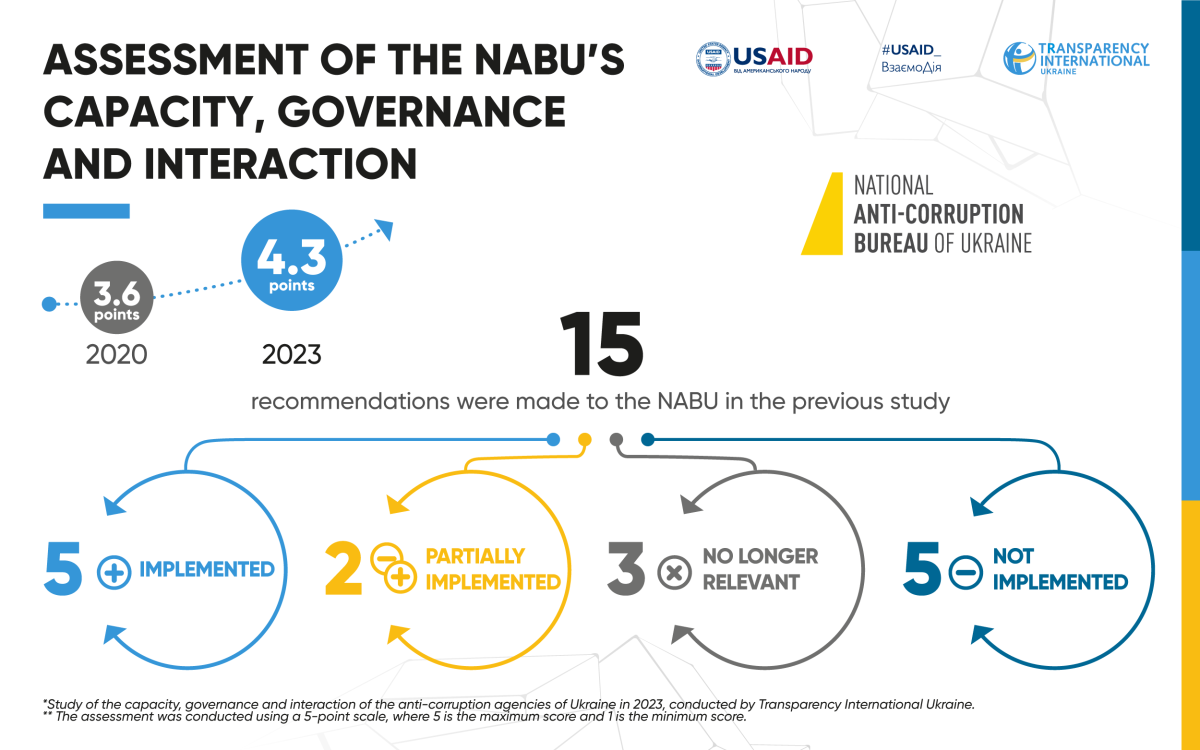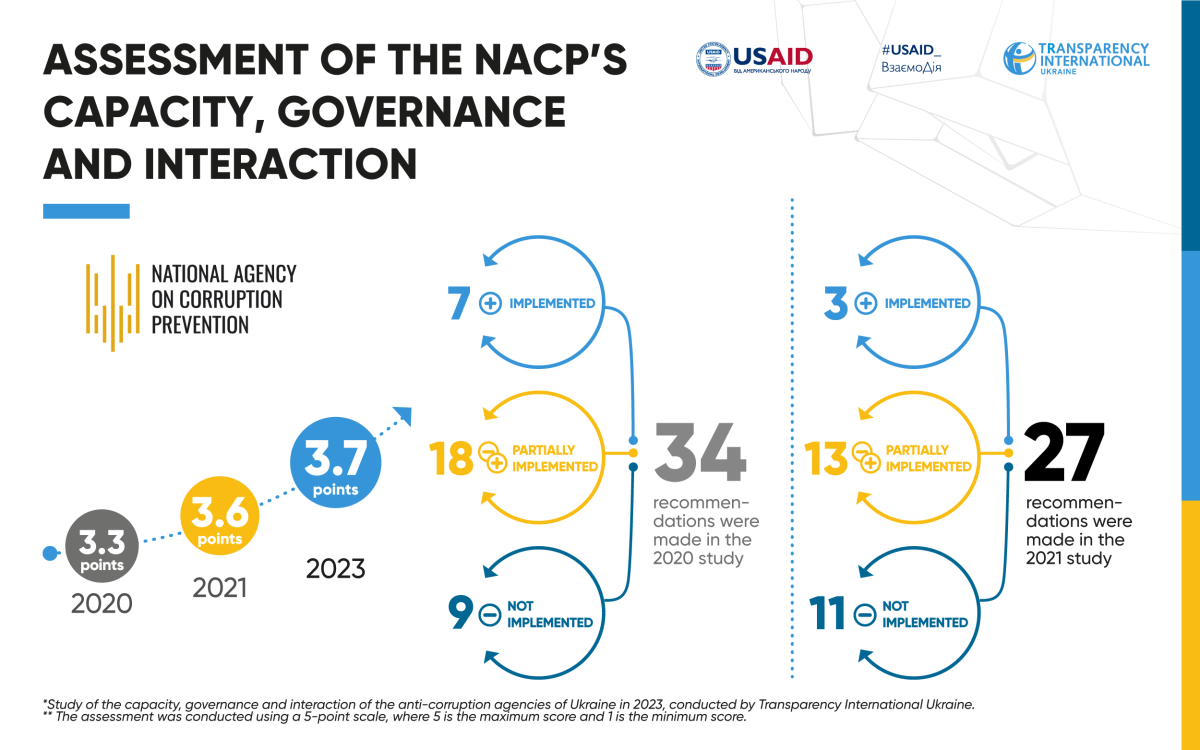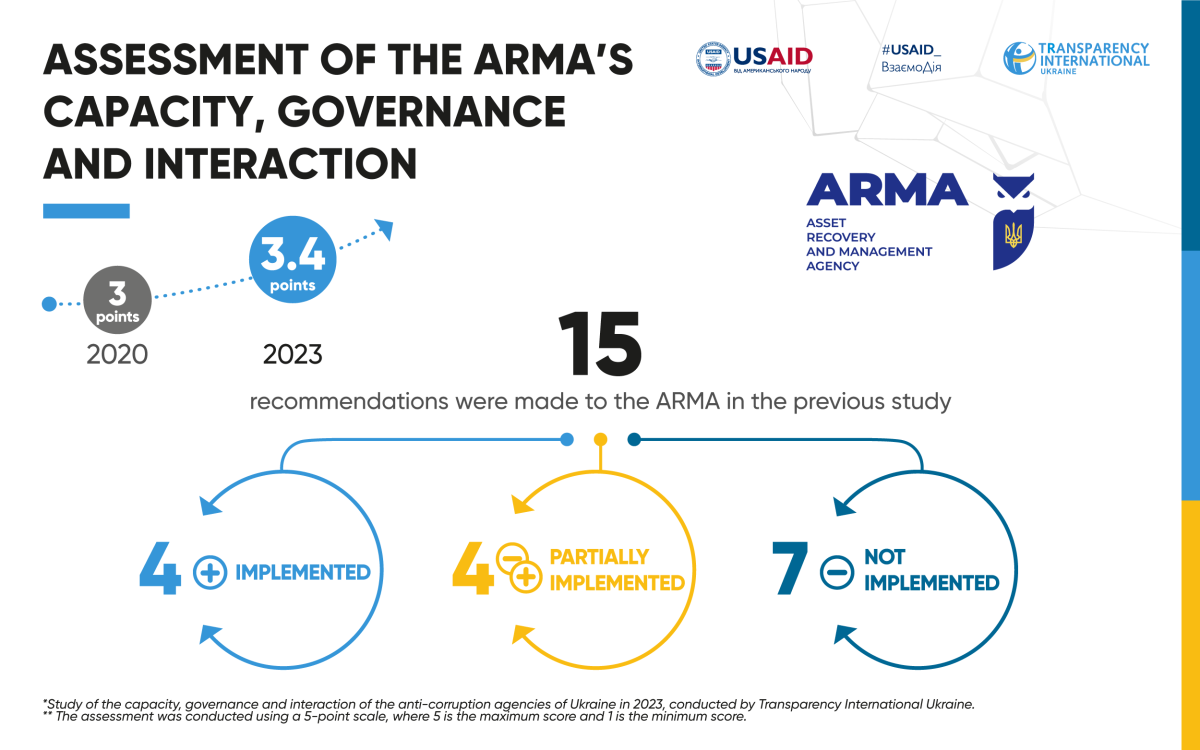

Results of the second study of the capacity, management, and interaction of anti-corruption infrastructure bodies.
Transparency International Ukraine published the second Study of Capacity, Governance, and Interaction of Agencies That Make Up Ukraine’s Anti-Corruption Infrastructure 2023, conducted with the support of the USAID project “Supporting Anti-Corruption Champion Institutions” (SACCI).
Anti-corruption authorities have improved their average overall score in comparison with the previous survey in 2020 by 0.5 points, from 3.4 to 3.9. The HACC obtained the best score at 4.6 points, while the ARMA had the worst result with 3.4 points.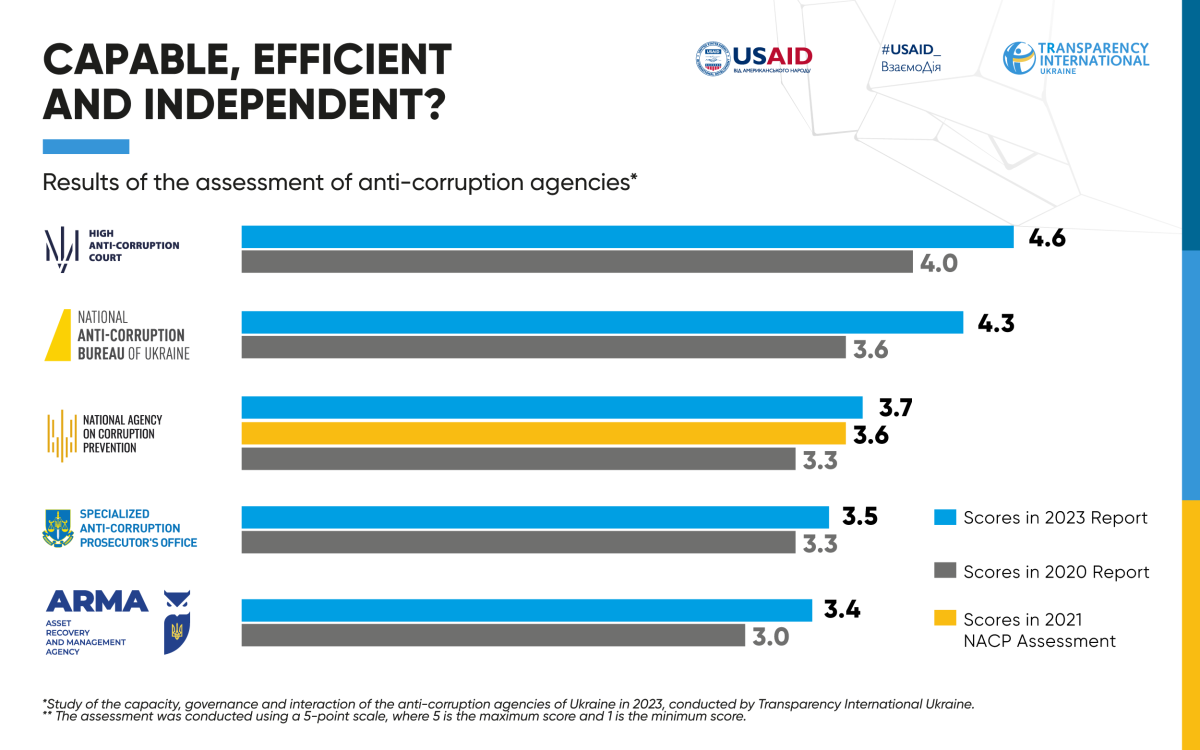
Anti-corruption agencies were scored on a scale from 1 to 5, with 5 being the maximum score. In the study, the anti-corruption bodies received the following scores:
1) The HACC — 4.6 points (4.0 in 2020)
2) The SAPO — 3.5 points (3.3 in 2020)
3) The NABU — 4.3 points (3.6 in 2020)
4) The NACP — 3.7 points (3.3 in 2020; 3.6 in the assessment conducted in 2021)
5) The ARMA — 3.4 points (3.0 in 2020)
Of the 103 recommendations provided in the 2020 study, 23 were fully fulfilled, 36 partially fulfilled, and 41 not fulfilled at all.
Anti-corruption authorities have improved their average overall score in comparison with the previous survey in 2020 by 0.5 points, from 3.4 to 3.9. The HACC obtained the best score at 4.6 points, while the ARMA had the worst result with 3.4 points.
Recommendations as a result of the second study
HACC
- Expand the HACC judiciary and proportionally increase the court’s apparatus, first of all, patronage service.
- Develop and adopt a legislative framework to counteract the abuse of procedural rights by parties to criminal proceedings
- Adopt a legislative framework to allow HACC judges to hear certain categories of cases alone.
- Ensure adequate funding for the HACC’s current needs, competitive salaries, and judicial compensation.
- Provide premises for the HACC Appeals Chamber and transfer it to the permanent management of the court.
SAPO
- Change the organizational and legal status of the SAPO.
- Amend the legislation to establish interdependence of the maximum number of SAPO prosecutors, NABU detectives, and HACC judges.
- Introduce a system of performance evaluation of prosecutors, including SAPO prosecutors. Establish predefined criteria for the effectiveness of the SAPO and each prosecutor in connection with all stages of criminal proceedings.
- Develop and approve the SAPO’s own communication strategy, as well as make efforts to develop English-language communication platforms.
- Provide for an independent assessment of the SAPO, separately from the Prosecutor General’s Office.
NABU
- Include the NABU expert service in the list of state specialized institutions.
- Provide budgetary funding for the establishment and technical equipment of the NABU expert service, and establish such a service.
- Develop and adopt technical requirements and solutions for the NABU’s autonomous wiretapping.
- Define criteria and methodology for external audit of the Bureau’s activities.
- Establish criteria for evaluating the effectiveness of integrity checks and lifestyle monitoring of NABU employees, as well as verification of data from individuals and legal entities.
NACP
- Align the staffing structure of the agency with the legislation
- Change the methodology and criteria for independent audit of the NACP
- Publish draft and approved documents on the website, hold public consultations before their adoption
- Increase the maximum number of NACP staff and the budget for the establishment of its local offices
- Hold transparent and open competitions for vacant positions
ARMA
- Ensure sufficient funding for ARMA in the State Budget.
- Involve ARMA in criminal proceedings prior to possible seizure and transfer of assets into management.
- Define a wider range of data for public access in the Unified Register of Seized Assets and ensure that this register is properly maintained.
- Ensure a proper regulatory framework for external audit of ARMA’s work.
- Establish interaction with the media and civil society. Develop and adopt a communication strategy for the agency and monitor its implementation.
The study covers the period from August 2020 to June 2023 with some events afterward. Anti-corruption agencies, namely the NACP, the NABU, the SAPO, the ARMA, and the HACC, were assessed on a scale from 1 to 5.
The research methodology has been developed taking into account the main approaches of the National Integrity System (NIS), developed and implemented by the international anti-corruption network Transparency International.
The draft study was provided to anti-corruption infrastructure agencies for preliminary perusal, comments, and corrections.
Appendices to the study include a review and a list of interviewees.
The study covers the period from August 2020 to June 2023 with some events afterward. Anti-corruption agencies, namely the NACP, the NABU, the SAPO, the ARMA, and the HACC, were assessed on a scale from 1 to 5.
This research was made possible by the support of the American people through the United States Agency for International Development (USAID) within the SACCI project. The contents of this publication are the sole responsibility of Transparency International Ukraine and do not necessarily reflect the views of USAID or the United States Government.
For reference: The Support to Anti-Corruption Champion Institutions (SACCI) Program in Ukraine is a six-year USAID initiative that has an objective to assist Ukraine to reduce corruption and increase the accountability and transparency of governance in Ukraine. The program seeks to empower key government institutions to fight corruption, build public support for and engagement in anti-corruption efforts, and reduce citizen tolerance to corruption, as well as ensure maximum transparency and accountability of Ukraine’s post-war recovery and reconstruction.




